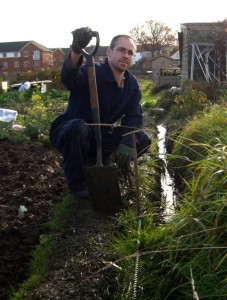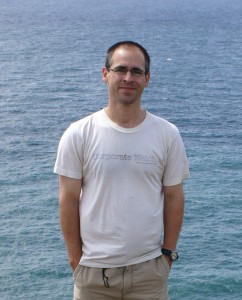Radical Green Blogger, Keith Farnish putting the R in Radical Green Blogger
Keith Farnish has his own views on the world and recently slammed in a comment so what could I do but interview him ; ) I am not sure I agree with everything he says or his approach, however he is an interesting guy and makes some good points well worth picking up on. I am also in favour of listening to all sides in the debate.


Tell me about your blog and what about believe in?
I normally describe myself as a radical blogger, environmental campaigner, father and husband; but above all I’m a human being and part of nature, who happens to have a deep interest in ensuring that the world we live in returns to a state in which humans can thrive as part of the global ecology. I run three web sites: The Earth Blog, on which I publish essays related to the global environment and human activity, The Unsuitablog, which has the aim of exposing all sorts of ethical hypocrisy, especially greenwashing, and Green Seniors, which is an internet hub for seniors who are concerned about the planet. I have written a book called “Time’s Up! An Uncivilized Solution To A Global Crisis”, which I made available for free online as “A Matter Of Scale” (www.amatterofscale.com ) because I believe that knowledge should be free to everyone.
What are the top 5 environmental lies?
That corporations care about the planet.
That governments care about the planet.
That you can “offset” destructive activities.
That cities can be sustainable.
That environmental problems can be solved through the application of technology.
Which greens are getting it wrong?
It depends what you mean by “green”: if you are genuinely motivated to be green because of your concern for the future of humanity and the ecology we depend upon, then you will almost certainly be in a good place and not hypocritical. On the other hand, if you associate being “green” with selling stuff (especially making a profit) or think that you can save the planet within the context of Industrial Civilization (as most mainstream environmental organisations do), then you are most definitely getting it wrong. We cannot fix our problems by doing the same things we have been doing to cause the problems: if it were like that then we would not have an environmental crisis at all.
What is the biggest tip you would give to a newbie to environmental issues?
Work out what is important to *you*, for that will help you understand how you need to act. If you are disconnected from the real world and still hooked into the industrial machine (and, believe me, most of us are), then your values will be skewed towards what is best for the *system*, not you. If you learn to connect with the real world, understand your place in it, how everything you do affects it, and how it affects you, then you will be on the right path. If you need a hand, then my article “What If We…Connected” (http://earth-blog.bravejournal.com/entry/32905/ ) and Chapter 12 of my book (http://www.farnish.plus.com/amatterofscale/chapter12.htm ) should help.
What do environmentalists do that you wish they wouldn’t?
(see question, two above) Also, I really wish people wouldn’t sweat the small stuff: this is a habit that has become ingrained in us by Industrial Civilization, because we are led to believe that we can only control trivial things around us; whereas there are huge changes you can make to your lives, and to society as a whole (and I don’t mean voting, signing petitions or going on marches — which change nothing), but only if you are prepared to look beyond the space this consumer culture wants us to remain within.
What do bloggers do that you wish they wouldn’t?
In general, I wish bloggers wouldn’t blog so often that it’s impossible to keep up — if you are only blogging to get RSS subscriptions or Diggs, then why bother blogging at all? Also, don’t regurgitate press releases — that’s just lazy. Press releases exist to present things in exactly the way the sender wants them to be presented — be critical, and if it’s a steaming pile of crap then say so!
Where do you see growth in the environmental field?
Sadly, the biggest area of growth will be in greenwashing: as humans become more aware of issues, companies and politicians have to work differently to sell their products and ideologies. If there were a huge growth in our ability to think and read critically then greenwashing would cease to exist. On the surface, there is nothing significantly positive happening (every global pact or treaty is just business as usual); but under the surface and between the cracks an awful lot is happening — environmental radicalism is on the rise, which is well overdue.
What do you do to improve the world?
I try to make people think and act differently; to work against the forces of Industrial Civilization that just want more and more of everything. There aren’t many of us at the moment, but all long-term things start small.
What is one thing about you that not many people know?
I used to hate broad beans until I started growing them myself; now I love them.
What’s your favorite book?
Very difficult, I love books. Can I have one fiction and one non-fiction?
Fiction: The Time Traveler’s Wife by Audrey Niffnegger, because it made me cry both times I read it.
Non-Fiction: I could choose lots of books about ecology and environment, but to be different I’m going to choose Into The Silent Land by Paul Broks, a beautiful book about the nature of self.
What are your contact details (email, company, blog, facebook, myspace, forums, etc)?
My main email address is [email protected]
I have a Facebook account but I only accept friends if I would want them as actual friends.
I also Twitter a bit (www.twitter.com/keithfarnish ) but block anyone who is selling stuff 🙂
My web sites are:
A Matter Of Scale (online version of “Time’s Up!”) – www.amatterofscale.com
The Earth Blog – www.theearthblog.org
The Unsuitablog – www.unsuitablog.com
Green Seniors – www.greenseniors.org
What events do you go to?
Ones where people are prepared to listen rather than just talk; I prefer pubs to conference centres.
How do you prefer to communicate?
In person or over the telephone, but because travelling has so many costs attached to it, I end up using email and Facebook an awful lot.
Who would you recommend, and why?
This is very personal, so rather than select anyone I know personally, I’ll choose some people you might have heard of…
-Writers I admire for their insight and thought: Derrick Jensen, Daniel Quinn, Daniel Everett, Douglas Adams, John Zerzan
-People I admire for what they have done: Dr David Kelly, Jesse Owens, John Lennon, Peter Gabriel, any member of an indigenous tribe that has fought back against oppression.
What is one thing people can do for you?
Read my book (the free one or the published one) and tell me what you think. www.amatterofscale.com
Radical Green Blogger, Keith Farnish putting the R in Radical Green Blogger
